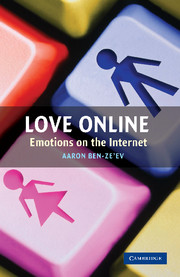Book contents
- Frontmatter
- Contents
- Preface
- 1 The seductive space
- 2 The paradoxical nature of online relationships
- 3 Emotions on the Net
- 4 Online imagination
- 5 Online privacy and emotional closeness
- 6 Is it worth it?
- 7 Flirting on- and offline
- 8 Cyberlove
- 9 Chatting is sometimes cheating
- 10 The future of romantic relationships
- Notes
- Bibliography
- Index
9 - Chatting is sometimes cheating
Published online by Cambridge University Press: 22 September 2009
- Frontmatter
- Contents
- Preface
- 1 The seductive space
- 2 The paradoxical nature of online relationships
- 3 Emotions on the Net
- 4 Online imagination
- 5 Online privacy and emotional closeness
- 6 Is it worth it?
- 7 Flirting on- and offline
- 8 Cyberlove
- 9 Chatting is sometimes cheating
- 10 The future of romantic relationships
- Notes
- Bibliography
- Index
Summary
A man can have two, maybe three love affairs while he's married. After that it's cheating.
Yves MontandThe moral aspects of online relationships are raising greater interest as such relationships become more and more popular and their moral implications ever more evident. Thus, more and more people are seeking divorce on grounds of virtual infidelity: their spouses are having online affairs. The fact that their spouses never met their lovers does not seem to eradicate the emotional and moral harm.
This chapter begins to examine the morality of online relationships by discussing the morality of imagination: is our imagination subject to the same moral criticism as that directed at our actual behavior? I demonstrate that the so-called “virtual relationships” are real in important aspects. Accordingly, there are considerable risks in becoming involved in such relationships. Nevertheless, their popularity, as well as their positive aspects, indicate that we cannot altogether avoid them. We must learn how to cope with them while reducing as much as possible their moral and emotional harm.
The morality of imagination
I remember the first time I had sex. It was very frightening. I was all alone.
Rodney DangerfieldImagination has an important role in our life. It is impossible to conceive of human beings without imagination. Imagination fulfills cognitive and affective functions crucial for human existence. Evading imagination would be harmful for human existence and in any case is impossible to achieve.
- Type
- Chapter
- Information
- Love OnlineEmotions on the Internet, pp. 199 - 222Publisher: Cambridge University PressPrint publication year: 2004



